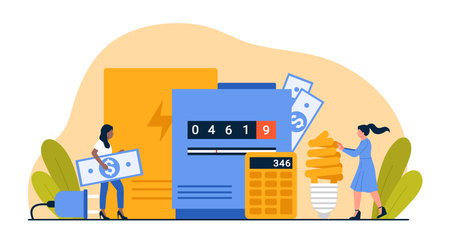1. Understanding Credit Scores in the U.S.
When it comes to buying a home in the United States, your credit score is one of the most important numbers you’ll ever need to know. But what exactly is a credit score, how is it calculated, and why does it have such a big impact on your financial life? Let’s break it down in simple terms.
What Is a Credit Score?
A credit score is a three-digit number that shows lenders how likely you are to pay back borrowed money. In the U.S., most people use the FICO score or VantageScore, which typically ranges from 300 to 850. The higher your score, the better you look to banks and other lenders when you want to borrow money—especially for big purchases like a home.
How Is Your Credit Score Calculated?
Your credit score is based on several factors from your credit report. Here’s a quick breakdown:
| Factor | Percentage of Total Score | Description |
|---|---|---|
| Payment History | 35% | Whether you pay bills on time |
| Amounts Owed | 30% | The total amount of debt you have |
| Length of Credit History | 15% | How long you’ve had credit accounts |
| New Credit | 10% | Recent applications for new credit |
| Credit Mix | 10% | The variety of credit types (credit cards, loans, etc.) |
Why Do Credit Scores Matter So Much?
Your credit score affects almost every part of your financial life in America. A good score can help you get approved for a mortgage with lower interest rates, saving you thousands of dollars over time. On the other hand, a low score might mean higher rates—or even being denied for a loan altogether. Lenders use your credit score as a way to predict risk, so maintaining a strong score makes it easier (and cheaper) to borrow money when you need it.
Understanding how your credit score works is key if you’re planning to buy a home or save for one in the future. By keeping track of your score and knowing what influences it, you can make smarter decisions that will benefit your wallet in the long run.
2. How Credit Scores Affect Homebuying Opportunities
Your credit score plays a huge role in your journey to buying a home in the United States. Lenders use this three-digit number to decide whether to approve your mortgage application, what interest rate you’ll get, and which loan programs you can access. Here’s how it all works:
Mortgage Approval
Lenders look at your credit score first when you apply for a home loan. Most conventional lenders require a minimum score of 620, but higher scores increase your chances of getting approved. If your score is below this threshold, you may have to explore alternative loans or work on improving your credit before applying.
Interest Rates
Your credit score directly affects the interest rate on your mortgage. Higher scores mean lower rates, which can save you thousands over the life of your loan. Check out the table below to see how much difference your credit score can make:
| Credit Score Range | Estimated Interest Rate (30-Year Fixed) | Monthly Payment ($300,000 Loan) |
|---|---|---|
| 760-850 | 6.0% | $1,799 |
| 700-759 | 6.25% | $1,847 |
| 660-699 | 6.75% | $1,946 |
| 620-659 | 7.25% | $2,049 |
| Below 620 | Usually not eligible for conventional loans | N/A |
Loan Terms and Options
A better credit score doesn’t just mean lower rates—it also gives you more choices when it comes to loan terms and programs. With good credit, you may qualify for:
- Lower down payments: Some lenders offer as little as 3% down for buyers with strong credit.
- No private mortgage insurance (PMI): You might avoid paying extra monthly fees if your score is high enough.
- Bigger loan amounts: Lenders are more willing to approve larger loans for buyers they trust.
Access to Special Homebuying Programs
Your credit score also determines if you’re eligible for certain government-backed loans and assistance programs:
- FHA Loans: These are designed for lower-credit buyers (minimum score 580 with 3.5% down).
- VA Loans: For veterans and active-duty military; generally requires a score of 620 or higher.
- USDA Loans: For rural buyers; most lenders prefer a score of at least 640.
- First-time Homebuyer Grants: Many state and local grants require a solid credit history.
The Bottom Line: Why Your Credit Score Matters When Saving for a Home
If you’re saving up to buy a house, don’t overlook your credit score. The better it is, the more money you’ll save in the long run—and the smoother your homebuying experience will be.

3. The Relationship between Credit Scores and Saving for a Home
When you start thinking about buying a home in the U.S., two big things come into play: your credit score and your ability to save money. These two factors are closely connected, and understanding their relationship can help make your journey to homeownership smoother.
How a Strong Credit Score Helps You Save
Your credit score isn’t just a number; it’s a snapshot of how trustworthy you look to lenders. A higher score means you’re likely to get better loan terms, including lower interest rates on your mortgage. This makes a huge difference in how much money you’ll need up front and over time.
| Credit Score Range | Typical Mortgage Interest Rate | Impact on Monthly Payment |
|---|---|---|
| 760-850 (Excellent) | Lowest available rates | Lower monthly payment |
| 700-759 (Good) | Slightly higher than best rates | Still affordable payments |
| 620-699 (Fair) | Moderate interest rates | Higher monthly payment |
| Below 620 (Poor) | Highest rates or may not qualify | Much higher payments, harder to save |
Saving for a Down Payment Gets Easier with Good Credit
If you have a strong credit profile, lenders might require a smaller down payment, especially with certain loan programs like FHA loans or conventional loans with private mortgage insurance (PMI). This means you don’t have to drain all your savings just to qualify for a home loan. Plus, lower interest rates free up more of your monthly budget, making it easier to build an emergency fund or pay for other moving costs.
The Double Benefit: Saving and Building Credit Together
You can actually work on both goals at once. For example, paying bills on time and keeping credit card balances low helps boost your credit score. At the same time, budgeting carefully so you don’t overspend allows you to put more aside for your future home.
Quick Tips for Balancing Credit Building and Saving:
- Set up automatic bill payments to avoid late fees and missed payments.
- Create a separate savings account just for your down payment fund.
- Avoid taking on new debt when preparing to buy a home.
- Check your credit report regularly for errors that could hurt your score.
- Make saving part of your monthly budget—every little bit adds up!
This strong link between your credit score and saving habits is key to unlocking better homebuying opportunities in the U.S. By focusing on both, you’ll be in a much better position when it’s time to start house hunting.
4. Strategies to Improve Your Credit Score Before Buying a Home
Why Your Credit Score Matters When Saving for a Home
Your credit score plays a huge role in the homebuying process in the U.S. Not only does it impact the mortgage rates you’ll be offered, but it also determines how much you’ll need to save upfront for your down payment and closing costs. That’s why boosting your score before shopping for a house can save you thousands of dollars in the long run.
Practical Tips to Boost Your Credit Score
1. Check Your Credit Reports Regularly
Start by getting free copies of your credit reports from AnnualCreditReport.com. Review them for errors or unfamiliar accounts that could be dragging your score down. If you spot any mistakes, dispute them right away with the credit bureaus.
2. Pay Down Outstanding Debt
Lenders look closely at your debt-to-credit ratio. Aim to keep your credit card balances below 30% of your available limit. Paying off high-interest cards first can also boost your score faster.
3. Make On-Time Payments a Priority
Payment history is the biggest factor in your credit score. Set up automatic payments or reminders to avoid missing due dates on loans, credit cards, and utilities.
4. Avoid Opening New Accounts Unnecessarily
Each time you apply for new credit, it can cause a small drop in your score. Try to avoid opening new lines of credit or taking out loans right before applying for a mortgage.
5. Don’t Close Old Credit Accounts
Length of credit history matters! Even if you’re not using older accounts, keeping them open (with zero balance) can help improve your average account age and overall score.
Credit Score Ranges and What They Mean for Homebuyers
| Credit Score Range | Impact on Homebuying |
|---|---|
| 760 and above | Best interest rates; lowest down payment requirements |
| 700-759 | Very good rates; favorable terms |
| 660-699 | Average rates; may need higher down payment |
| 620-659 | Higher rates; limited loan options; bigger savings needed |
| Below 620 | Difficult to qualify; highest rates; substantial savings required or alternative loan programs needed |
Sustainable Habits for Maintaining Healthy Credit
- Create and stick to a monthly budget so you don’t overextend yourself financially.
- Avoid “maxing out” any one credit card—even during big purchases—by spreading expenses across multiple cards or paying off balances quickly.
- If you’re struggling with debt, contact creditors to discuss hardship plans before falling behind on payments.
- Keep an eye on your credit utilization ratio month-to-month as this has immediate effects on your score.
- If possible, become an authorized user on a family member’s well-managed card—this can help build positive credit history quickly.
Taking these steps months before you start house hunting can make a significant difference in both your ability to qualify for a mortgage and the affordability of your future home.
5. Why Being Credit-Savvy Matters in the American Housing Market
Understanding the Power of a Good Credit Score
In the U.S., your credit score is more than just a number—it’s a key to unlocking financial opportunities, especially when it comes to buying a home. Having a strong credit score can mean better mortgage rates, lower monthly payments, and even access to different types of loans. But being credit-savvy goes beyond just getting approved for a mortgage; it’s about setting yourself up for long-term financial health.
The Long-Term Benefits of Smart Credit Management
When you manage your credit wisely, you’re not only improving your chances of buying a home—you’re also building wealth and financial stability for years to come. Here’s how good credit habits can make a difference:
| Credit-Smart Action | Long-Term Benefit |
|---|---|
| Pays bills on time | Builds positive payment history, leading to higher scores and trust with lenders |
| Keeps balances low on credit cards | Lowers debt-to-income ratio, making you more attractive to mortgage lenders |
| Checks credit reports regularly | Helps spot errors early and prevent identity theft or fraud |
| Avoids opening too many new accounts at once | Prevents unnecessary hard inquiries that could temporarily drop your score |
How Credit Impacts Homeownership and Wealth-Building
Owning a home is one of the most common ways Americans build wealth over time. When you have good credit, you qualify for better loan terms, which means lower interest rates. Over the life of your mortgage, this can save you tens of thousands of dollars—money that stays in your pocket or can be invested elsewhere.
Example: The Cost Difference Between Good and Fair Credit Scores
| Credit Score Range | Estimated 30-Year Mortgage Rate* | Total Interest Paid on $300,000 Loan* |
|---|---|---|
| 760-850 (Excellent) | 6.0% | $347,515 |
| 620-639 (Fair) | 7.5% | $455,302 |
*Rates and totals are for illustrative purposes only and may vary based on market conditions.
Financial Stability Starts With Smart Saving and Credit Habits
Saving for a down payment is important, but so is making sure your credit is in top shape. By being proactive—paying bills on time, keeping debt low, and monitoring your credit—you set yourself up not just to buy a home, but to build lasting wealth and security for yourself and your family.


